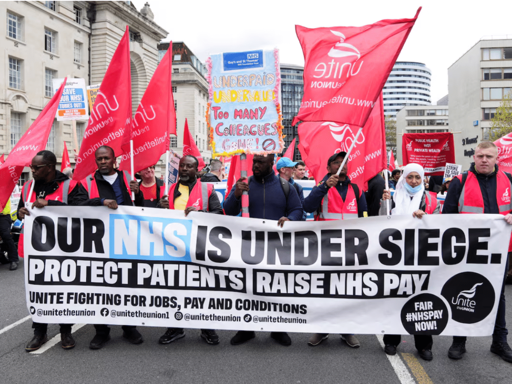NHS resident doctors are set to walk out on strike tomorrow to protest against dwindling pay and a lack of trainee posts. The planned industrial action, organised by the British Medical Association (BMA), will no doubt cause major disruptions given that junior doctors make up over half of the NHS workforce.
During past strikes, there have been instances in which hospitals have liaised and negotiated with unions to determine a safe level of staff cover for critical services. This means that some doctors poised to go on strike might ultimately go into work. Their advocacy for better employment rights does not diminish their top priority: patient wellbeing.
‘You make decisions about safety, not the BMA’
According to a letter seen by the Telegraph, NHS boss James Mackey has urged hospitals to carry on as normal during the strikes. This includes carrying out nearly all previously-planned operations. Mackey reportedly wrote:
Data suggests that this season’s flu will be picking up just as we come out of this latest set of strikes.
It is imperative that we plan our approach very carefully this time round to maintain a strong performance during the period of industrial action and in the weeks that follow. We’re in a marathon, not a sprint.
The NHS boss has linked this to the imperative of maintaining “laser focus” to uphold patient safety. However, how exactly he expects hospitals to maintain a steely focus with a reduced headcount remains unaddressed.The phrase “this time around” in Mackey’s letter is also telling. The NHS boss has a track record for telling hospitals to disregard union-led staffing safety levels. Back during the July strikes this year, he told managerial staff that:
We’ve been very, very clear we want to have a different approach this time.You have noticed already we are in a different space compared to where we were last time, much more instructive to the BMA, much more resistant to their demands.Frankly we and you make decisions about safety, not the BMA. Do what you do best, make sensible decisions and we’ll stick together.
And again, for the coming strikes, Mackey has ordered hospitals to stay open:
to the fullest extent possible – with at least 95 per cent of elective activity continuing compared with what would otherwise have been expected.
Risking patient safety
During the previous strikes, the BMA unambiguously stated that Mackey’s desire for ‘business as usual’ had stretched hospital staff “far too thinly”. And this week, reacting to Mackey’s extreme demands, BMA council chairman Tom Dolphin fired back:
It’s unfortunate that NHS England would once again risk patient safety by instructing trusts to continue the full volume of elective procedures during industrial action.If trusts genuinely believe they can provide adequate safety cover to maintain elective activity at the level NHS England is demanding, despite significant numbers of staff being absent, that is their decision. However, they must remember that patient safety must always be the priority.In the last round of action, we received a large number of requests to be exempted from strikes from a handful of trusts who hadn’t planned appropriately despite plenty of warning. This was deeply disappointing from senior managers who should be focusing on safety and not political targets.
Half of all NHS doctors going on strike will always have a negative effect on patient care. If it didn’t, the strike would be completely ineffective. However, trying to carry on as if everything is normal, ignoring the problem, will only make things worse.This situation was, and still is, completely avoidable. Health Secretary Wes Streeting has repeatedly refused to make a credible move to restore resident’s pay, which has taken a 21% hit in real terms since 2008.Streeting secured £1bn to make over 18,000 NHS staff redundant earlier this week. We must ask — why could he find the money to fire people, but not to pay hardworking doctors that have tolerated wage stagnation for years a decent wage?Featured image via Reuters
From Canary via this RSS feed


